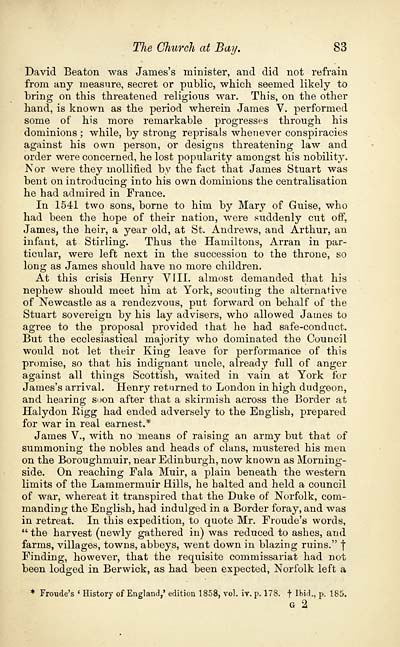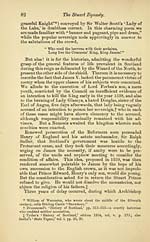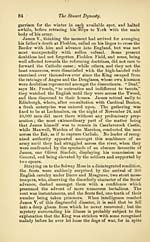Stuart dynasty
(103) Page 83
Download files
Complete book:
Individual page:
Thumbnail gallery: Grid view | List view

The Church at Bay. 83
David Beaton was James's minister, and did not refrain
from any measure, secret or public, which seemed likely to
bring on this threatened religious war. This, on the other
hand, is known as the period wherein James V. performed
some of his more remarkable progresses through his
dominions; while, by strong reprisals whenever conspiracies
against his own person, or designs threatening law and
order were concerned, he lost popularity amongst his nobility.
Nor were they mollified by the fact that James Stuart was
bent on introducing into his own dominions the centralisation
he had admired in France.
In 1541 two sons, borne to him by Mary of Guise, who
had been the hope of their nation, were suddenly cut off,
James, the heir, a year old, at St. Andrews, and Arthur, an
infant, at Stirling. Thus the Hamiltons, Arran in par-
ticular, were left next in the succession to the throne, so
long as James should have no more children.
At this crisis Henry VIII. almost demanded that his
nephew should meet him at York, scouting the alternative
of Newcastle as a rendezvous, put forward on behalf of the
Stuart sovereign by his lay advisers, who allowed James to
agree to the proposal provided that he had safe-conduct.
But the ecclesiastical majority who dominated the Council
would not let their King leave for performance of this
promise, so that his indignant uncle, already full of anger
against all things Scottish, waited in vain at York for
James's arrival. Henry returned to London in high dudgeon,
and hearing soon after that a skirmish across the Border at
Halydon Kigg had ended adversely to the English, prepared
for war in real earnest.*
James V., with no means of raising an army but that of
summoning the nobles and heads of clans, mustered his men
on the Boroughmuir, near Edinburgh, now known as Morning-
side. On reaching Fala Muir, a plain beneath the western
limits of the Lammermuir Hills, he halted and held a council
of war, whereat it transpired that the Duke of Norfolk, com-
manding the English, had indulged in a Border foray, and was
in retreat. In this expedition, to quote Mr. Froude's words,
" the harvest (newly gathered in) was reduced to ashes, and
farms, villages, towns, abbeys, went down in blazing ruins." |
Finding, however, that the requisite commissariat had not
been lodged in Berwick, as had been expected, Norfolk left a
* Froude's ' History of England,' edition 1858, vol. iv. p. 178. f Ibid., p. 185.
a 2
David Beaton was James's minister, and did not refrain
from any measure, secret or public, which seemed likely to
bring on this threatened religious war. This, on the other
hand, is known as the period wherein James V. performed
some of his more remarkable progresses through his
dominions; while, by strong reprisals whenever conspiracies
against his own person, or designs threatening law and
order were concerned, he lost popularity amongst his nobility.
Nor were they mollified by the fact that James Stuart was
bent on introducing into his own dominions the centralisation
he had admired in France.
In 1541 two sons, borne to him by Mary of Guise, who
had been the hope of their nation, were suddenly cut off,
James, the heir, a year old, at St. Andrews, and Arthur, an
infant, at Stirling. Thus the Hamiltons, Arran in par-
ticular, were left next in the succession to the throne, so
long as James should have no more children.
At this crisis Henry VIII. almost demanded that his
nephew should meet him at York, scouting the alternative
of Newcastle as a rendezvous, put forward on behalf of the
Stuart sovereign by his lay advisers, who allowed James to
agree to the proposal provided that he had safe-conduct.
But the ecclesiastical majority who dominated the Council
would not let their King leave for performance of this
promise, so that his indignant uncle, already full of anger
against all things Scottish, waited in vain at York for
James's arrival. Henry returned to London in high dudgeon,
and hearing soon after that a skirmish across the Border at
Halydon Kigg had ended adversely to the English, prepared
for war in real earnest.*
James V., with no means of raising an army but that of
summoning the nobles and heads of clans, mustered his men
on the Boroughmuir, near Edinburgh, now known as Morning-
side. On reaching Fala Muir, a plain beneath the western
limits of the Lammermuir Hills, he halted and held a council
of war, whereat it transpired that the Duke of Norfolk, com-
manding the English, had indulged in a Border foray, and was
in retreat. In this expedition, to quote Mr. Froude's words,
" the harvest (newly gathered in) was reduced to ashes, and
farms, villages, towns, abbeys, went down in blazing ruins." |
Finding, however, that the requisite commissariat had not
been lodged in Berwick, as had been expected, Norfolk left a
* Froude's ' History of England,' edition 1858, vol. iv. p. 178. f Ibid., p. 185.
a 2
Set display mode to:
![]() Universal Viewer |
Universal Viewer | ![]() Mirador |
Large image | Transcription
Mirador |
Large image | Transcription
Images and transcriptions on this page, including medium image downloads, may be used under the Creative Commons Attribution 4.0 International Licence unless otherwise stated. ![]()
| Histories of Scottish families > Stuart dynasty > (103) Page 83 |
|---|
| Permanent URL | https://digital.nls.uk/94819002 |
|---|
| Description | A selection of almost 400 printed items relating to the history of Scottish families, mostly dating from the 19th and early 20th centuries. Includes memoirs, genealogies and clan histories, with a few produced by emigrant families. The earliest family history goes back to AD 916. |
|---|

